|
|
|
Sort Order |
|
|
|
Items / Page
|
|
|
|
|
|
|
| Srl | Item |
| 1 |
ID:
164689
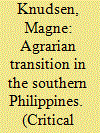

|
|
|
|
|
| Summary/Abstract |
On the southern Philippine island of Mindanao, scholars have documented a precarious land tenure, livelihood, and security situation for many smallholders. Agrarian political economy studies provide insightful analyses of the underlying causes of much poverty and violence on the island. Less attention has been given to cases of smallholder success. This article proposes that conditions for smallholder farming, even among ethnic minority groups, are more varied across the island than the literature suggests. In upland villages of north-central Mindanao, agrarian transition is a multi-directional process that produces different outcomes among households, kin groups, and villages. The main case study is a thriving mixed swidden and fixed field Maranao-Muslim farming village. Almost all the households in the village have successfully claimed land as their own and diversified and improved their livelihoods in recent times. To explain these positive outcomes, the article uses a relational approach and draws on anthropological literature on kinship, land tenure, and place to assess the bargaining power of smallholders in land deals. A stronger cross-fertilization of key insights in agrarian political economy and anthropological literature on kinship enriches the debate on agrarian transition in the southern Philippines.
|
|
|
|
|
|
|
|
|
|
|
|
|
|
|
|
| 2 |
ID:
164675
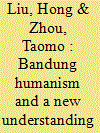

|
|
|
| 3 |
ID:
164690
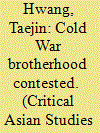

|
|
|
|
|
| Summary/Abstract |
As the largest contingent of Americans in postwar South Korea, the G.I. best represented the United States’ Cold War objectives. Their deployment was an emblem of hard power containment, but the G.I. also embodied soft power integration, and through both, G.I.s helped to promote Pax Americana. This article focuses on the militarized masculinity of these ambassadors of America and their people-to-people diplomacy in South Korea between 1954 and 1966. These American G.I.s constructed their militarized masculinity vis-à-vis the Korean male Other, their “lesser” counterparts – the hapless houseboy, the inferior partner soldier, and the menacing slicky boy. At the same time, this liberal imperialism did not go uncontested. Violent imaginaries of the American G.I. from the borderlands were used by Koreans to demand a new bilateral framework – the Status of Forces Agreement in 1966 – to replace the outmoded wartime extraterritorial jurisdiction wielded by the American military after cessation of hostilities on the Korean peninsula in 1953. The militarized masculinity practiced in everyday encounters, thus, became the basis of a critique of American liberal imperialism in one of the United States closest Cold War “brother” nations.
|
|
|
|
|
|
|
|
|
|
|
|
|
|
|
|
| 4 |
ID:
164691
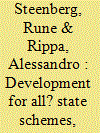

|
|
|
|
|
| Summary/Abstract |
The past decade of development schemes has been experienced very differently by various groups within the city of Kashgar in the Xinjiang Uyghur Autonomous Region of China. The recent exacerbation of social inequalities, stratification, and tensions in Kashgar is a structural consequence of two phases of government policies: an accelerated formalization of the economy and remodelling of the city-scape as part of modernistic development implemented before 2014, followed by a phase of strong securitization. Based on long-term ethnographic fieldwork between 2009 and 2017, this paper analyzes the situation, reactions, and strategies of different groups of Uyghur residents of Kashgar to cope with the changing socio-economic and political environment.
|
|
|
|
|
|
|
|
|
|
|
|
|
|
|
|
| 5 |
ID:
164681
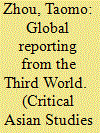

|
|
|
|
|
| Summary/Abstract |
Originating from the 1955 Bandung Conference, the Afro-Asian Journalists’ Association (AAJA) promoted international collaboration among journalists in newly independent countries. Built on an inclusive foundation of peaceful co-existence, the AAJA contributed to the development of expansive global information networks, lively intellectual traffic, and rich visual arts among Afro-Asian nations. However, the cosmopolitanism of its early years was later undermined by the decline of constitutional democracy in Indonesia and a lack of cohesion among Afro-Asian nations. After the September Thirtieth Movement in Indonesia in 1965, the AAJA relocated to Beijing and was mobilized by the Chinese state to promote the P.R.C. as the leader of an embittered Third World’s battle against American imperialism and Soviet revisionism. In the early 1970s, ideological fervor began abating in China. During this time, Mao’s reframing of the three worlds, which was based on developmental measurements, redirected the AAJA’s Third World discourse to issues of modernization until its quiet dissolution in 1974. The history of the AAJA demonstrates the complex and often conflicted ways in which two important post-colonial states – Indonesia and China – conceptualized “the Third World” and formulated media representations during the Cold War.
|
|
|
|
|
|
|
|
|
|
|
|
|
|
|
|
| 6 |
ID:
164687
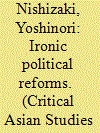

|
|
|
|
|
| Summary/Abstract |
An elected Senate and the party-list system are two institutional innovations of the 1997 Thai Constitution designed to support political reforms. This paper sheds light on one unintended effect of these reforms: they have allowed scores of political families to maintain or even tighten their grip on Parliament. Combining aggregate data and case studies, this paper shows that a sizable number of elected senators and party-list parliamentary members are related, by birth or marriage, to other parliament members elected in the post-1932 period. The well-intended reforms have concentrated parliamentary power in the hands of these families, many of which represent the excesses of Thailand’s full-blown electoral democracy. The survival and resilience of these families diminish reform opportunities by further entrenching corruption, clientelism, violence, and electoral fraud, as well as by deepening dynastic rule that militates against political pluralism and inclusiveness.
|
|
|
|
|
|
|
|
|
|
|
|
|
|
|
|
| 7 |
ID:
164692


|
|
|
|
|
| Summary/Abstract |
This article examines the content of North Korea's juche ideology by analyzing official texts in comparison with Confucian classics and new religious movements in South Korea. The comparison revealed a series of similarities that vividly demonstrate that juche ideas have absorbed core elements of Korean and East Asian philosophical traditions.
|
|
|
|
|
|
|
|
|
|
|
|
|
|
|
|
| 8 |
ID:
164683
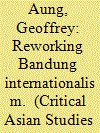

|
|
|
|
|
| Summary/Abstract |
This commentary examines how futurity has been imagined across politics and political economy in Burma/Myanmar. Three areas are discussed: the revolutionary horizons of anti-colonialists, who combined Buddhist and Marxist ideas of historical progress; the developmental socialism of the early independence area, with its industrial telos and modernist commitments; and a contemporary development project in southern Myanmar, where processes of dispossession are troubling earlier temporal imaginaries. I suggest that a vision of postcolonial transformation coheres across anti-colonial and early independence claims to futurity. This temporal imaginary, which I call postcolonial futurism, promises transitions from farm to factory, peasant to the proletariat, and precapital to capital. This imaginary resonated widely. Today, however, scholars of South and Southeast Asia argue that modernist promises of transition now lack empirical and political purchase amid ongoing dispossession and trends towards low-wage, informal labour. Yet in the wake of postcolonial futurism, responses to dispossession are creating novel political possibilities. Responding to Kuan-Hsing Chen’s call to rework Bandung internationalism in the present, I consider how struggles over dispossession today indicate both openings and limits for the making of new political futures. Integrating Glen Coulthard’s work on colonialism and dispossession, I argue that decolonizing subjectivity is central to this process.
|
|
|
|
|
|
|
|
|
|
|
|
|
|
|
|
| 9 |
ID:
164678
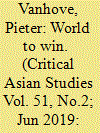

|
|
|
|
|
| Summary/Abstract |
This article analyzes Chinese contributions to the Afro-Asian Writers’ Bureau’s efforts to reinvent World Literature from an anti-imperialist and anti-capitalist perspective. The Afro-Asian Writers’ Bureau was founded as a counter-narrative to Eurocentric conceptions of World Literature and universal culture. The AAWB’s vision was inspired by a Marxian understanding of worldliness. Relying on Chinese archival materials, this article shows how Chinese representatives to the AAWB, including Zhou Yang and Mao Dun, shifted from an explicitly Soviet, socialist-realist model for World Literature inspired by Maxim Gorky to a progressively independent, nationalist course in the wake of the Sino-Soviet split. The story of the AAWB is one of competing universal visions. The Chinese contributions to the AAWB are also reflected in China’s current expanding cultural influence and soft power in the Global South.
|
|
|
|
|
|
|
|
|
|
|
|
|
|
|
|
|
|
|
|
|